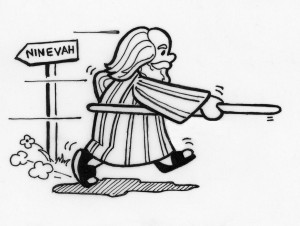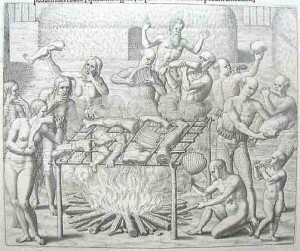====================
This sermon was preached on Sunday, October 14, 2012, at St. Paul’s Episcopal Church, Medina, Ohio, where Fr. Funston is rector.
(Revised Common Lectionary, Proper 23B: Job 23:1-9,16-17; Psalm 22:1-15; Hebrews 4:12-16; and Mark 10:17-31. These lessons can be read at The Lectionary Page.)
====================
 In last week’s reading from the Old Testament, you will remember, God gave Satan permission to test the righteousness of a man of integrity named Job. First all of Job’s possessions and his family are taken from him: his oxen and donkeys are carried off by Sabeans; his sheep are burned up in a fire; his camels are stolen by the invading Chaldeans; and the collapse of a house kills all of Job’s ten children. But Job, being a righteous man, does not curse God; instead, he shaves his head, tears his clothes, and says, “Naked I came from my mother’s womb, and naked shall I return there; the Lord gave, and the Lord has taken away; blessed be the name of the Lord.” Job does not sin or curse God. (1:21-22)
In last week’s reading from the Old Testament, you will remember, God gave Satan permission to test the righteousness of a man of integrity named Job. First all of Job’s possessions and his family are taken from him: his oxen and donkeys are carried off by Sabeans; his sheep are burned up in a fire; his camels are stolen by the invading Chaldeans; and the collapse of a house kills all of Job’s ten children. But Job, being a righteous man, does not curse God; instead, he shaves his head, tears his clothes, and says, “Naked I came from my mother’s womb, and naked shall I return there; the Lord gave, and the Lord has taken away; blessed be the name of the Lord.” Job does not sin or curse God. (1:21-22)
Therefore, Satan returns to God and seeks permission to cause Job bodily, suffering as well. God agrees saying, “He is in your power; only spare his life.” (2:6) Satan, therefore, afflicts him with a loathsome skin disease. Job’s response is to scratch his skin with broken pottery and sit down in a pile of ashes. Job’s wife prompts him to “curse God, and die” but Job answers that she is speaking foolishly, and she departs the scene and will not be heard from again. As Chapter Two closes, Job’s three friends, Eliphaz the Temanite, Bildad the Shuhite, and Zophar the Naamathite, having heard of his calamity, come to comfort him. When they arrive, they join him in mourning, tearing their own clothes, weeping loudly, throwing dust on their heads, and sitting with him in silence for a week.
After that week of silence, a dialog ensues between the friends and Job. Each speaks in turn in three cycles of addresses, and Job answers them. In the first cycle – and I admit that this is a very simplistic summary – Job curses the day he was born, but essentially holds that he is blameless and does not deserve what has befallen him; this indeed, will be his position throughout the rest of the book.
Eliphaz is the first of his friends to speak; basically, he asserts his agreement with Job that Job is blameless. “Is not your fear of God your confidence,” says Eliphaz, “and the integrity of your ways your hope?” (4:6) So Eliphaz advises him to “seek God, and to God . . . commit [your] cause.” (5:8) Eliphaz is sure that if he does so, Job will live to a ripe old age. But Job, in his misery is not able to hear what his friend says; he continues to complain of “the anguish of [his] spirit” and “the bitterness of [his] soul.” (7:11) “I loathe my life,” says Job, “I would choose death.” (7:15-16)
The next to speak is his friend Bildad. Bildad also speaks of Job’s innocence and integrity, but in a somewhat more conditional way. He’s not quite as sure as Eliphaz: “If you are pure and upright,” he says, “surely then [God] will rouse himself for you and restore to you your rightful place.” (8:6) Job is more responsive to Bildad. He acknowledges that what his friend says is true, but then rejects his advice asking, “How can a mortal be just before God? If one wished to contend with [God], one could not answer him once in a thousand.” (9:2-3) Although he rejects Bildad’s advice, this is an important turning point in the story, I think, because it is here that the seed of the idea of contending with God in a lawsuit is planted in Job’s mind. Nonetheless, he still complains of the bitterness in his soul and says he’d rather die.
The last of his friends to speak is Zophar. Zophar isn’t buying the blamelessness argument. He believes that punishments and rewards in life follow directly from our actions; if Job has suffered these calamities, Job must have committed some great sin. He simply assumes that Job is guilty: he condemns Job for babbling and for mocking the Almighty. “Shall no one shame you?” he asks Job. “Know this, Job! God exacts of you less than your guilt deserves.” (11:3,6) But Job will have none of Zophar’s condemnation: “I am a just and blameless man,” he asserts. (12:4) “I may be a laughingstock, but I am a just and blameless man.”
Now the idea of taking God to court has rooted firmly in Job’s imagination: “I would speak to the Almighty,” he declares, “and I desire to argue my case with God.” (13:3) As the first cycle ends, in fact, Job is starting to formulate his arguments.
In the second cycle of speeches, the characters leave behind the specific issue of whether Job is blameless or guilty, righteous or sinful. In fact, the second cycle of speeches seems to have little or nothing to do with Job himself. Instead, the characters debate the issue of whether, in fact, the retribution that sometimes falls upon the wicked is a result of their own blameworthiness, and all of the friends seem to be in agreement that it is. Whether this debate has anything to do with Job’s situation is somewhat ambiguous; none of the friends identifies Job as the wicked person they describe in their speeches. In answer to each of them, Job complains that their words are not a comfort to him. At the end of the second cycle, he tells them, “You comfort me with empty nothings” and “there is nothing left of your answers but falsehood.” (21:34) Apparently in reply to Job – it’s not really all that clear that it is a response, however – Eliphaz tells him that he should follow the advice of the righteous who say, “Agree with God, and be at peace; in this way good will come to you.” (22:21)
This is where the lectionary has brought us today, to Chapter 23, most of which is today’s Old Testament lesson. We are more than halfway through the Book of Job; the first two cycles of speeches have been made; and Job’s mind seems to have been made up. He is determined to take God to court and argue his case. “I would lay my case before him, and fill my mouth with arguments.” (23:4) In the verses the lectionary has left out, Job continues to argue his innocence, asserting that
[God] knows the way that I take; when he has tested me, I shall come out like gold. My foot has held fast to his steps; I have kept his way and have not turned aside. I have not departed from the commandment of his lips; I have treasured in my bosom the words of his mouth. (23:10-12)
Job’s problem now, he believes, is that he doesn’t know where to find God! “If I go forward, he is not there; or backward, I cannot perceive him; on the left he hides, and I cannot behold him; I turn to the right, but I cannot see him.” (23:8-9) This uncertainty seems to shake Job’s confidence in his case: “God has made my heart faint,” he says, “the Almighty has terrified me.” But faint and terrified though he may be, Job does present his case. None of the friends speak again, except Bildad who interrupts to ask Job’s own question, “How can a mortal be can righteous before God?” (25:1-6) Job pleads his case with eloquence and at the conclusion of the third cycle, his three friends have “ceased to answer Job, because he was righteous in his own eyes.” (32:1)
So what are we to make of today’s lesson from Job, this brief chapter in which we find Job wondering where to find God? What balm for our souls, what spiritual medicine for the “Patients of Job” does it offer?
Job’s confusion and anxiety at the elusiveness of God are echoed in today’s Psalm whose first verse is familiar to us from the story of Christ’s Crucifixion:
My God, my God, why have you forsaken me?
and are so far from my cry
and from the words of my distress? (Ps. 22:1)
God seems to be so far away that God cannot be found: “He is not there . . . I cannot perceive him . . . I cannot behold him . . . I cannot see him.” Job feels that he has been abandoned by God. But wait! Job knows that God has tested him; Job has known God’s terrifying presence. Job finds this reassuring; although Job cannot see God, God can perceive Job! God’s knowledge of Job is his comfort; it will assure his vindication. Although Job does not know where to find God, God knows where to find Job and this convinces Job that he can, in the words of today’s reading from the Letter to the Hebrews, “approach the throne of grace with boldness.” In fact, he shall do so, and so can we!
Not knowing where or how to find God is the existential problem of modern life. Baptist theologian Brooks Ramsey sums up the problem nicely in this question: “It is easy to sense God’s presence when things are going right. But where is God when things fall apart?” While the Book of Job offers no easy answers to this question, it does assure us that God is there even though we, like the character Job, may be unable to perceive God’s presence. The French Reformed theologian Jacques Ellul wrote in his book Hope in Time of Abandonment that it is in those times when we share Job’s frustration that hope is truly born:
Hope comes alive only in the dreary silence of God, in our loneliness before a closed heaven, in our abandonment . . . Hope is a protest before this God, who is leaving us without miracles and without conversions, that he is not keeping his Word.
Now, I don’t believe that God is ever truly silent, nor that God does not keep God’s promises; but I do know that there are times in our lives when we are all like Job – we cannot seem to find God; we do not sense God’s presence; and we do not know where to look for God.
Hope, as Ellul said, is humanity’s answer to God’s apparent silence, to God’s elusiveness, and it is through hopeful prayer that we demand the fulfillment of God’s promises; it is through prayer that we, like Job, approach the throne of grace and plead our case. We do not need to know where to find God in order to pray; we do not need to know where to find God in order to have hope.
Our Christian faith that assures us that in our times of pain and suffering God comes to us. God finds us and comes to us in the loving acts of others. In illness, God finds us and comes to us in the ministrations of the medical professionals who treat us. In emotional distress, God finds us and comes to us through friends, family members, and others who offer us encouragement. In moments of deep need, God finds us and comes to us in a mysterious way through those who care. This gives us hope and courage. We need not cry out like the character Job, “Oh, that I knew where I might find [God];” (23:3) God knows where to find us.
This is the balm for our souls, the spiritual medicine that we, the “Patients of Job,” find in today’s lesson from the Book of Job, that in our times of need, God knows where to find us and that God does, indeed, come to us. Amen.
 “Take nothing!” That’s not an instruction to be footloose and fancy free! When Jesus sends out the twelve with these instructions he is making them utterly dependent on the communities to which they may go; they are to rely completely on hospitality of others. Like Blanch Dubois, they are always to depend on the kindness of strangers.
“Take nothing!” That’s not an instruction to be footloose and fancy free! When Jesus sends out the twelve with these instructions he is making them utterly dependent on the communities to which they may go; they are to rely completely on hospitality of others. Like Blanch Dubois, they are always to depend on the kindness of strangers. Jonah’s a fool! Trying to flee “from the presence of the Lord.” As if! This lesson today is an interesting contrast to Sunday’s Eucharistic Lectionary reading from Book of Job (Job 23:1-9,16-17) in which Job was bewildered and confused because he felt unable to find God: “Oh, that I knew where I might find him, that I might come even to his dwelling!” (Job 23:2) Jonah, on the other hand, would be perfectly happy never to find, or be found by, God.
Jonah’s a fool! Trying to flee “from the presence of the Lord.” As if! This lesson today is an interesting contrast to Sunday’s Eucharistic Lectionary reading from Book of Job (Job 23:1-9,16-17) in which Job was bewildered and confused because he felt unable to find God: “Oh, that I knew where I might find him, that I might come even to his dwelling!” (Job 23:2) Jonah, on the other hand, would be perfectly happy never to find, or be found by, God. Sound familiar? Jesus sounded a lot like Micah at times:
Sound familiar? Jesus sounded a lot like Micah at times: In last week’s reading from the Old Testament, you will remember, God gave Satan permission to test the righteousness of a man of integrity named Job. First all of Job’s possessions and his family are taken from him: his oxen and donkeys are carried off by Sabeans; his sheep are burned up in a fire; his camels are stolen by the invading Chaldeans; and the collapse of a house kills all of Job’s ten children. But Job, being a righteous man, does not curse God; instead, he shaves his head, tears his clothes, and says, “Naked I came from my mother’s womb, and naked shall I return there; the Lord gave, and the Lord has taken away; blessed be the name of the Lord.” Job does not sin or curse God. (1:21-22)
In last week’s reading from the Old Testament, you will remember, God gave Satan permission to test the righteousness of a man of integrity named Job. First all of Job’s possessions and his family are taken from him: his oxen and donkeys are carried off by Sabeans; his sheep are burned up in a fire; his camels are stolen by the invading Chaldeans; and the collapse of a house kills all of Job’s ten children. But Job, being a righteous man, does not curse God; instead, he shaves his head, tears his clothes, and says, “Naked I came from my mother’s womb, and naked shall I return there; the Lord gave, and the Lord has taken away; blessed be the name of the Lord.” Job does not sin or curse God. (1:21-22) This obscure little verse in the book of the Prophet Micah is best known to Christians from the story of the visitation of the wisemen in Matthew’s Gospel:
This obscure little verse in the book of the Prophet Micah is best known to Christians from the story of the visitation of the wisemen in Matthew’s Gospel: Three cheers for the women of the church! Seriously, it seems to have ever been thus: women do the “heavy lifting” but end up little noticed in the background. One wonders if Jesus and the twelve could have done what they did if these women “who provided for them out of their resources” had not been so generous . . . .
Three cheers for the women of the church! Seriously, it seems to have ever been thus: women do the “heavy lifting” but end up little noticed in the background. One wonders if Jesus and the twelve could have done what they did if these women “who provided for them out of their resources” had not been so generous . . . .  Micah gets just a wee bit graphic here with his metaphors, with his condemnation of political leaders, don’t you think? He has accused them of being cannibals! He describes them as treating the people like meat for a meal; they have butchered them, flayed them, broken their bones, and chopped them up for stew meat! It’s awful!
Micah gets just a wee bit graphic here with his metaphors, with his condemnation of political leaders, don’t you think? He has accused them of being cannibals! He describes them as treating the people like meat for a meal; they have butchered them, flayed them, broken their bones, and chopped them up for stew meat! It’s awful! Micah condemns those who plot to do wrong “on their beds” and then carry out their plans when they rise; he prophesies God’s retribution against them. But then he is told not to do so; those to whom he preaches not only reject his prophecy, they tell him not to preach such things at all. He concludes that they only want to hear their preachers tell them of pleasant things, the things they enjoy; they want preachers who will utter “empty falsehoods” and preach of “wine and strong drink.”
Micah condemns those who plot to do wrong “on their beds” and then carry out their plans when they rise; he prophesies God’s retribution against them. But then he is told not to do so; those to whom he preaches not only reject his prophecy, they tell him not to preach such things at all. He concludes that they only want to hear their preachers tell them of pleasant things, the things they enjoy; they want preachers who will utter “empty falsehoods” and preach of “wine and strong drink.” Have you ever visited a church which as part of its normative worship service gives congregants an opportunity to voice aloud their own prayers to God? It may surprise some that the Episcopal Church is one such religious group. In the typical service of the Holy Eucharist in the Episcopal Church, following readings from Scripture, the sermon and a recitation of the Nicene Creed, the congregation is led in a responsive cycle of prayer called The Prayers of the People.
Have you ever visited a church which as part of its normative worship service gives congregants an opportunity to voice aloud their own prayers to God? It may surprise some that the Episcopal Church is one such religious group. In the typical service of the Holy Eucharist in the Episcopal Church, following readings from Scripture, the sermon and a recitation of the Nicene Creed, the congregation is led in a responsive cycle of prayer called The Prayers of the People. It’s a darn good question, “Why do you call me “Lord, Lord,” and do not do what I tell you?” As we come to the last month of the 2012 political campaign, it is one which needs to be carefully considered by many Christians on all sides of the political divide. Are the values on which Christian voters are making their decisions those taught by Jesus, or are they cultural values dressed up in Christian clothing? One-issue voters in particular should take a broader look at their choices; just because a candidate supports your position on a question of particular importance to you does not mean his or her overall platform conforms well to the values of the Gospel, or does what Jesus told us to do.
It’s a darn good question, “Why do you call me “Lord, Lord,” and do not do what I tell you?” As we come to the last month of the 2012 political campaign, it is one which needs to be carefully considered by many Christians on all sides of the political divide. Are the values on which Christian voters are making their decisions those taught by Jesus, or are they cultural values dressed up in Christian clothing? One-issue voters in particular should take a broader look at their choices; just because a candidate supports your position on a question of particular importance to you does not mean his or her overall platform conforms well to the values of the Gospel, or does what Jesus told us to do.

